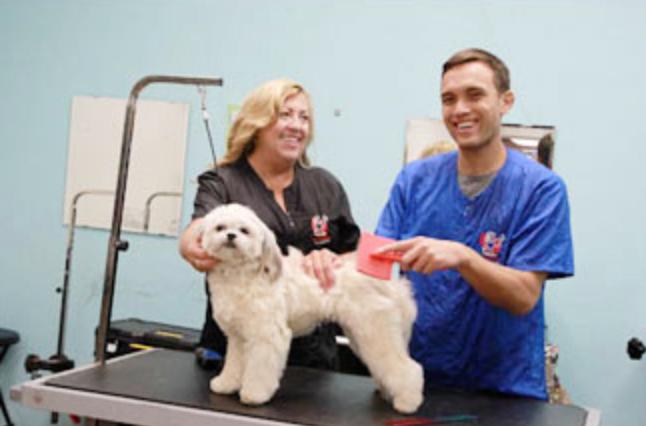In a world where our furry companions hold a special place in our hearts, the art of grooming goes far beyond mere aesthetics; it is a celebration of the bond between humans and dogs. Welcome to the realm of dog grooming academies—a haven for aspiring pet stylists and passionate animal lovers alike. Here, skilled instructors impart the knowledge and techniques needed to transform shaggy coats into polished masterpieces, ensuring every tail wags in delight. As we delve into the curriculum, ethos, and unique experiences offered by these academies, we will uncover not only the technical skills required to excel in this profession but also the profound understanding of canine behavior that is essential for every dog groomer. Whether you’re contemplating a new career path or simply wish to enhance your grooming skills for your beloved pet, this exploration reveals the vital role dog grooming academies play in shaping the future of pet care.
Table of Contents
- Exploring the Curriculum of a Dog Grooming Academy
- Essential Tools and Techniques for Aspiring Dog Groomers
- Navigating Career Opportunities After Graduation
- Building Client Relationships in the Dog Grooming Business
- Q&A
- In Summary
Exploring the Curriculum of a Dog Grooming Academy
The curriculum at a dog grooming academy is meticulously designed to equip aspiring groomers with both foundational and advanced skills. Typically, students will engage in a variety of subjects, including but not limited to:
- Grooming Techniques: Learning the art of clipping, trimming, and styling various dog breeds.
- Canine Anatomy: Understanding the body’s structure to ensure safe grooming practices.
- Skin and Coat Care: Exploring the different types of coats and skincare needs.
- Health and Safety: Emphasizing the importance of maintaining hygiene and recognizing common ailments.
Moreover, practical experience plays a significant role in the training process. Many academies include hands-on sessions where students groom real dogs under the mentorship of experienced professionals. This allows for immediate feedback and improvement. Additionally, students can expect to cover:
- Customer Service: Essential skills for managing client interactions and building repeat business.
- Business Management: Insight into running a successful grooming salon.
- Special Techniques: Styling for specific breeds and competition grooming.
Essential Tools and Techniques for Aspiring Dog Groomers
For aspiring dog groomers, possessing the right tools is just as crucial as mastering grooming techniques. High-quality clippers are essential for efficient and precise grooming, allowing groomers to trim fur quickly without causing discomfort to the pet. Coupled with ergonomic scissors, which are indispensable for detailing, these tools serve as the foundation of any grooming toolkit. Other important items include brushes suited for different coat types, combs for detangling, and nail clippers designed to ensure the comfort of dogs during a necessary grooming procedure.
Additionally, understanding various grooming techniques can make all the difference in delivering a professional finish. This includes learning how to properly bath dogs, as well as mastering drying techniques to avoid matting. Utilizing hydraulic grooming tables can facilitate easy positioning and ensure the safety of both the groomer and the dog. Groomers should also be familiar with the use of styling products such as sprays and conditioners that can enhance the appearance and health of the dog’s coat. To summarize the essential tools and techniques, here’s a simple table:
| Tool/Technique | Purpose |
|---|---|
| Clippers | Efficient fur trimming |
| Scissors | Detailing and touch-ups |
| Brushes & Combs | Detangling & grooming |
| Nail Clippers | Comfortable nail trimming |
| Hydraulic Tables | Safe positioning for dogs |
| Styling Products | Enhancing coat appearance |
Navigating Career Opportunities After Graduation
As you step into the world of professional dog grooming, it’s essential to explore various pathways that can lead to a fulfilling career. Graduating from a dog grooming academy equips you with not just the practical skills of pet grooming, but also valuable industry insights and connections. Consider the following avenues to broaden your horizons:
- Independent Grooming Business: Set up your own grooming salon, offering personalized services tailored to a loyal clientele.
- Mobile Grooming Services: Take your skills on the road by offering grooming in a mobile van, providing convenience for pet owners.
- Pet Spa Partnership: Collaborate with pet spas or veterinary clinics, enhancing their service offerings with your grooming expertise.
- Specialized Grooming: Focus on niche markets like show dogs or specific breeds, attracting clients looking for specialized services.
In addition to traditional roles, the pet grooming industry provides opportunities for growth and specialization. You may consider roles such as pet care educator, where you can facilitate workshops or training programs, or even pursue certifications in advanced techniques like creative grooming. Below is a brief overview of potential career paths, along with required skills:
| Career Path | Key Skills Required |
|---|---|
| Grooming Salon Owner | Business Management, Customer Service |
| Mobile Groomer | Time Management, Flexibility |
| Grooming Instructor | Teaching Skills, Communication |
| Pet Product Sales | Marketing, Product Knowledge |
Building Client Relationships in the Dog Grooming Business
Creating lasting connections with clients in the dog grooming business is essential for success. A friendly and inviting atmosphere can make all the difference when a pet owner walks through the door. Consider implementing the following strategies to enhance your customer relationships:
- Personalized Service: Take the time to know the clients and their pets by remembering names and preferences.
- Regular Communication: Send follow-up messages, appointment reminders, and even birthday greetings for the pets.
- Feedback Channels: Encourage clients to share their thoughts and suggestions to create a sense of involvement.
Providing an exceptional experience goes beyond grooming; it embodies understanding pet owners’ concerns and needs. Training your staff to build rapport can significantly improve client satisfaction. The following elements are crucial in fostering a positive relationship:
| Element | Impact |
|---|---|
| Trust | Encourages repeat business and word-of-mouth referrals. |
| Transparency | Builds confidence in services offered and pricing. |
| Quality of Care | Ensures pets are treated with love and respect, prompting loyalty. |
Q&A
Q&A: Exploring the World of Dog Grooming Academies
Q1: What is a dog grooming academy?
A1: A dog grooming academy is a specialized educational institution where aspiring groomers learn the art and science of grooming dogs. These academies offer hands-on training, classroom instruction, and practical experience, covering a range of topics from basic grooming techniques to advanced styling and pet care.
Q2: Who should consider enrolling in a dog grooming academy?
A2: Anyone with a passion for dogs and a desire to pursue a career in pet care should consider enrolling. This includes animal lovers looking to turn their hobby into a profession or individuals who wish to enhance their skills as a pet stylist, dog bather, or kennel assistant.
Q3: What skills can one expect to learn in a dog grooming academy?
A3: Students can expect to learn a variety of skills including, but not limited to, bathing techniques, clipping and trimming, ear cleaning, nail trimming, handling different breeds, understanding coat types, and recognizing health issues. Many academies also teach customer service and business management skills for those looking to start their own grooming business.
Q4: Are there any prerequisites for admission into a dog grooming academy?
A4: Most dog grooming academies do not have strict prerequisites, but a basic understanding of animal behavior and a love for dogs can help prospective students succeed. Some programs may require students to be a certain age or possess a high school diploma.
Q5: How long does it typically take to complete a dog grooming program?
A5: Completion time varies by institution and program type. Some intensive courses can be finished in a matter of weeks, while more comprehensive programs may last several months. Many academies offer flexible schedules to accommodate different lifestyles.
Q6: Is certification necessary to work as a dog groomer after graduation?
A6: While certification is not always required, it can enhance a groomer’s credibility and marketability. Some states may have licensing requirements, so it’s important to research local regulations. Many dog grooming academies provide certification upon completion of their program, validating the skills learned.
Q7: What career opportunities are available after graduating from a dog grooming academy?
A7: Graduates can pursue various career paths such as working in pet salons, veterinary offices, or mobile grooming services. Others may choose to start their own independent grooming business. Some even find opportunities in specialized fields like breed standards and show grooming.
Q8: How does attending a dog grooming academy benefit one’s understanding of dog care?
A8: Attending an academy provides a structured learning environment led by experienced professionals. Students gain hands-on experience with different breeds and grooming tools, helping them develop a deeper understanding of canine anatomy, health issues, and behavior, which all contribute to overall pet well-being.
Q9: Are there opportunities for continued education after graduation from a dog grooming academy?
A9: Absolutely! The field of dog grooming is always evolving, with new techniques and styles emerging regularly. Many academies offer advanced courses, workshops, and seminars for alumni to continue honing their skills. Additionally, professionals can pursue certifications in specialized areas such as grooming for dog shows or advanced styling.
Q10: What is the best way to choose a dog grooming academy?
A10: To choose the right academy, consider factors such as the curriculum, the qualifications of the instructors, student reviews, location, and whether the school offers hands-on training opportunities. Visiting the campus or attending an open house can also help prospective students gauge the environment and facilities.
This Q&A format aims to provide a thorough yet approachable insight into dog grooming academies, catering to potential students and animal enthusiasts alike.
In Summary
As we close the door on our exploration of dog grooming academies, it’s clear that the journey to becoming a skilled groomer is as rewarding as it is challenging. These academies serve as vital stepping stones, nurturing passion and expertise, while fostering a community of canine caretakers dedicated to enhancing the lives of our furry friends. Whether you’re an aspiring groomer or a pet owner curious about the artistry behind grooming, embracing this path opens a world of creativity, compassion, and connection. The relationship between groomer and dog is built on trust and understanding, and through education, we cultivate a future where every wagging tail leaves the grooming table looking and feeling its best. So, whether you choose to pursue this career or simply appreciate the artistry of dog grooming, remember—it’s all about the love we share with our loyal companions. Until our next adventure, happy grooming!



